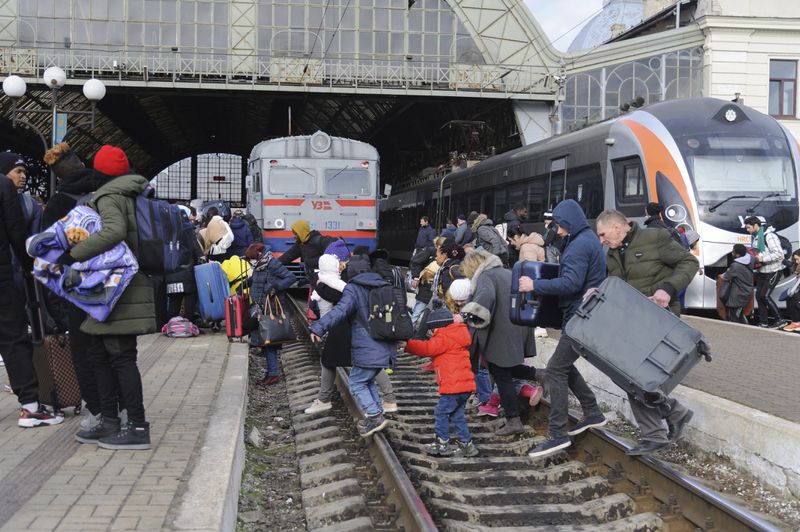"The realtor said that today there were more than 300 requests, with only 5 apartments successfully found."
"We searched all over the Lviv oblast, nothing came out in Lviv, but we managed to find an apartment in Lutsk, so we are heading there."
"I will probably have to return to Kharkiv."
I hear similar words in Lviv every single day. I think the situation is the same in many places throughout western Ukraine and eastern Poland, and such words float around the territories those fleeing the war go. Over the last month, thousands of people have found accommodation in Lviv, and nobody knows how many people have failed to do so.
Observing how difficult it is now to find a temporary home for people who have fled the bombing, I want to cry out: "We told you about social housing and the rental market issue, and you did nothing!" But anger will not bring any progress in supporting at least some of the needy. Therefore, I will take Lviv as an example in course of my research on what is happening now with housing.
According to official data alone, Lviv has hosted 200 thousand people. However, in fact, this number is 2-3 times higher. The local rental market has shown how unregulated it is. One-room apartments are sometimes rented for $ 1,000. Due to the sharp increase in the demand for housing, refugees are unable to stay in the city, and landlords are either illegally raising prices by pushing for evictions or violating the rights of the tenants by directly evicting them.

An apartment for rent, Lviv – 30 000 UAH. Total area – 12 square meters / A screenshot from the site with a rental offer.
How did those responsible for housing policy react to the crisis?
All that the city authorities have managed to do is intimidate landlords in a moralizing manner. The need to receive people in Lviv was topical even before the full-scale invasion, but only on March 3, did Mayor Andriy Sadovy draw attention to the problem and stated:
“Prices for living in Lviv should remain the same as before the war. A landlord or hotelier who sets an inflated price for an apartment is a looter! Report such cases to the City Hotline – 1580. We will act as required in wartime. We will check and expose the names of looters to the public, as well as transmit data to the SBU [Security Service of Ukraine]”.
Although such symbolic gestures are better than ignoring the problems altogether, they have little effect on the rental market realities. After all, if you are an IDP (internally displaced person) and need a roof over your head, then first you spend your precious time looking for housing that you can afford, not at exorbitant prices. If you are evicted by raising the price, then no public lists or fear of the SBU will outweigh the right to private property of the apartment. The landlord may even call the police to evict you.
Those who rent housing under a contract are more likely to pressure a landlord. But even in such a situation, it is easier to use the right to private property than to prove in court that eviction before the contract expiration is possible only under certain conditions. Legal mechanisms for protecting tenants were complicated to apply even before the war. The Civil Code guarantees the protection of tenant rights, but the actual implementation of such guarantees requires litigation and the involvement of lawyers. At the same time, the mechanism for protecting the private property rights of a landlord is quite simple: you only need to call the police and show the documents that prove ownership of housing. Thus, the rights of a tenant are more difficult to protect than the rights of a landlord.

People gather to catch a train and leave Ukraine for neighboring countries at the railway station in Lviv, western Ukraine, Feb. 26, 2022. AP Photo / Mykola Tys.
The central government can and must impose a ban on evictions, as well as freeze prices on the rental market. But among the laws the Verkhovna Rada [a unicameral parliament of Ukraine] is working on, there is no hint of attempts to protect tenants, and the appeals from housing policy researchers are ignored.
Except for rental market regulation, a necessary step is to create new opportunities for IDPs. The development of non-profit housing could provide shelter for refugees. But social housing in Ukraine has never functioned as a purposeful policy. At present, there are isolated initiatives from some government agencies in this direction. For example, in Lviv oblast, dormitories of some educational institutions are used to resettle the displaced, and the Ministry of Culture and Information Policy encourages communities to organize the resettling of the refugees on their own. The Cabinet of Ministers has picked up a wave of the citizens’ self-organization and proposed a "Prykhystok" [Shelter] platform that connects those who can provide temporary housing with those who need it. Such practices are episodic. They seem to reproduce the logic of social housing policy, but do not constitute a purposeful and effective program.
Flogging a dead horse
Social housing policies would work better if they were developed in peacetime. Moreover, why are the regional military administrations and the Ministry of Culture addressing housing issues, and not the Ministry of Regional Development, Construction, Housing, and Communal Services or officials directly responsible for housing policy?
The answer is the following: they are busy with something completely different. As before, the main efforts of the authorities are not aimed at providing affordable housing to as many citizens as possible, but to support construction. The Ministry of Regional Development, the Confederation of Builders of Ukraine, DIAM [State Inspectorate for Architecture and Urban Planning of Ukraine] and other actors responsible for developing and implementing housing strategies are only pretending to meet the needs of IDPs and people whose homes have been destroyed.
Their vision in terms of solving the issue is reduced to:
(1) creating a construction financing system based on risky financial mechanisms, such as securitization (creation of a mortgage debt market),
(2) purchasing housing from developers at public expense,
(3) subsidizing the purchase of housing for IDPs.
Only quite wealthy people among those in need can access housing through such policies. Developers will be the real beneficiaries of such policies because all financial flows are directed to them. The affordability of housing and profit from construction are mutually exclusive things, and the latter is now the predominant policy. Neither local nor central authorities can or know how to respond to the housing needs of hundreds of thousands of refugees. Therefore, housing problems are largely solved by grassroots self-organization initiatives. The example of Lviv shows how many citizens host both relatives and strangers, how public organizations and initiatives redevelop various spaces for housing, and how many landlords keep the "old," already non-market price for housing.
The initiative I joined is trying to help refugees with special needs find long-term shelter. And it's hard, even though we personally know some realtors and plumbers, we know the city and we have communication skills. How should newcomers, families with young children and persons with reduced mobility, deal with this chaos?
Such practices of solidarity are examples of the principle on which housing policy should be based: housing is a basic need, not a source of profit, not a financial asset.
Unfortunately, the case of Lviv is not very different from other Ukrainian cities. The countries of the European Union are not ready to provide affordable housing for Ukrainian refugees either. Although social housing and rental market regulations are more prevalent in the EU than in Ukraine, in recent decades the privatization and financialization of housing have gradually made it less accessible even to EU citizens, not to mention migrants and refugees. In conditions of a small amount of available housing, conflicts may arise between locals and newcomers. So, in addition to the question of whether EU countries want to accept Ukrainian women, it is worth asking whether they will be able to provide them with affordable housing, decent work, and social services. And with this question arises another one: how to create conditions that would equalize the rights of citizens and non-citizens, Ukrainians and Syrians. Answers to such questions can save lives.
Time to shout until we are heard
Some mistakes are better not to learn from. One of these mistakes is Ukraine's real estate-oriented housing policy. The consequence of this policy is that people are not only forced to move to another part of their city, but also to return or stay in places where they may die from the actions of the Russian army.
Before the war, I called these processes “displacement.” I don't know what to call them now. But I am convinced that it is vital to continue to speak out and reach those who make decisions about housing at the local, national, and international levels, cry out for it both in Ukraine and the EU. We have research, developments, and recommendations, now it is necessary to exert political pressure. Speak out in favor of social housing, the protection of tenants' rights, the inadmissibility of the dominance of a right to private property over the right to shelter, and the urgent need to plan social and democratic housing policy for the future. Cry out for it with me because it's not just about Lviv and not just about Ukraine.
Author: Alona Liasheva
Translated from Ukrainian by Yuliia Kulish
Cover image: The New York Times



